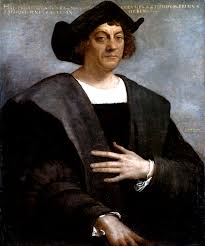
As the debate rages on the politically correct observation of Columbus Day in the United States of America, many cities are passing legal resolutions to observe the festival as Indigenous people's day.
The controversy around the festival is not new. However, with the issue of migrants being a central theme in the US elections, let's look at some objections raised by some eminent historians against the celebration of the cult of Christopher Columbus.
Quoting an extract from his book, the late Latin American historian Eduardo Galenao made a fascinating foray into historical conjecture when he discussed border restrictions in the 21st century and compared them with the legends of conquistadors while holding a discussion with Amy Goodman during a program with Democracy Now.
"Christopher Columbus couldn't discover America, because he didn't have a visa or even a passport. Pedro Alvares Cabral couldn't get off the boat in Brazil, because he might have been carrying smallpox, measles, the flu or other foreign plagues. Hernan Cortes and Francisco Pizarro never even began the conquest of Mexico and Peru, because they didn't have working papers. Pedro de Alvarado was turned away from Guatemala, and Pedro de Valdivia couldn't even enter Chile, because they didn't bring proof of a clean record. And the Mayflower pilgrims were sent back to sea from the coast of Massachusetts: the immigration quotas were full."
Another historian Howard Zinn described some of the details of how Columbus personally ordered the enslavement and mutilation of the native Arawak people in a bid to repay his investors:
Now, from his base in Haiti, Columbus sent expedition after expedition into the interior. They found no gold fields, but had to fill up the ships returning to Spain with some kind of dividend. In the year 1495, they went on a great slave raid, rounded up 1,500 Arawak men, women, and children, put them in pens guarded by Spaniards and dogs, then picked the 500 best specimens to load onto ships. Of those 500, 200 died en route. The rest arrived alive in Spain and were put up for sale by the archdeacon of the town, who reported that although the slaves were "naked as the day they were born," they showed "no more embarrassment than animals." Columbus later wrote: "Let us in the name of the Holy Trinity go on sending all the slaves that can be sold."
But too many of the slaves died in captivity. And so Columbus, desperate to pay back dividends to those who had invested, had to make good his promise to fill the ships with gold. In the province of Cicao in Haiti, where he and his men imagined huge gold fields to exist, they ordered all persons 14 years or older to collect a certain quantity of gold every three months. When they brought it, they were given copper tokens to hang around their necks. American Indians found without a copper token had their hands cut off and bled to death.
It would perhaps be fair to remember that as our historical knowledge evolves, a hero in one historical may be interpreted as a villain in another. Check out this video to know more about Columbus Day controversy.









!['Had denied Housefull franchise as they wanted me to wear a bikini': Tia Bajpai on turning down bold scripts [Exclusive]](https://data1.ibtimes.co.in/en/full/806605/had-denied-housefull-franchise-they-wanted-me-wear-bikini-tia-bajpai-turning-down-bold.png?w=220&h=138)



